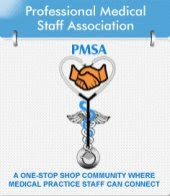This article was written by one of our members.
Front Desk Impressions
By a patient and staff trainer.
Here at PMSA, we often discuss training and how important everyone in the practice is in the impression that your practice gives your patients. This week for me, this really became apparent. I have a chronic condition that has required that I go to a specialist on a regular basis. The specialist that I have chosen is in a new high rent area that is known for the upscale care that the providers in the area provide for their patients. In this particular practice, the physicians only hire RNs or higher to work in the back office. They do not hire medical assistants and focus in advanced education for all clinical staff. The back office is a warm caring, highly trained area. My only complaints have ever been the tendency to call me “hon” or “sweetie” by the staff and the name tags.
All of the clinical staff has “P.A.” after the staff member’s name. I asked what this stood for since two of the girls had already mentioned that they were RNs. I wondered if they actually did have PAs on staff and was told no, but there are ARNPs. I then asked what it stood for and the staff was not able to tell me. Having P.A. on the name tags is confusing and goes back to our argument here at PMSA of staff misleading patients of their training. There have been several cases of lawsuits of medical assistants or front desk staff referring to themselves as “nurses”. I am sure this was not intended at my providers, but it is confusing and especially troubling when the staff cannot explain the meaning.
As mentioned the clinical staff is highly trained, unfortunately this does not seem to follow through with the front desk. I was early for my appointment when the office opened in the morning and actually got there before a couple with a child. The couple was waited on first and when the receptionist was done with the family, I tried to check in and had my head bitten off. “I will get your chart when I get a chance, just sit down.” I was amazed, I had waited patiently and she was actually done with the family that arrived after me when I tried to sign-in. Having worked a front desk for many years, I try to be understanding on how you can get busy, but she did not even try to acknowledge me or speak to me again. I found out later she even had my date of birth wrong in the chart and if she had actually checked me in, she might have discovered the mistake. The nurse had to write the correct date in the chart. I have had many problems with the front desk, including being given the wrong information for a procedure. Over several visits, I have watched as they discussed patient information at the front desk, took personal calls and basically do most of the things that we tell staff not to do, but find that they often do anyway.
The providers have gone to a lot of trouble to make sure the clinical staff is professional and providing the best care possible (except for the “sweetie” problem). I think they would be amazed at the behavior of their front desk. Over the course of my visits, I have had the chance to hear other patients discuss how rude the front desk is and how they hate to deal with some of the front desk.
This is something that happens all of the time in practices. Working as a manager, I have been guilty of focusing attention on the clinical staff, but the front desk is the first and the last contact patients have with your patients. Often patients do not say anything, but switch providers or tell others about the way they were treated in your practice. I really like my provider and have improved while under his care. I am planning on letting the practice know about the type of service that patients receive and see what happens. I am hoping that they will extend the same high level of care and training that they expect from the clinical staff and start expecting it from the front as well.
To help practices with staff training, PMSA offers training modules, membership, webinars and an upcoming conference. Visit our website at www.thepmsa.org to learn more.
Thursday, May 28, 2009
Subscribe to:
Post Comments (Atom)

No comments:
Post a Comment